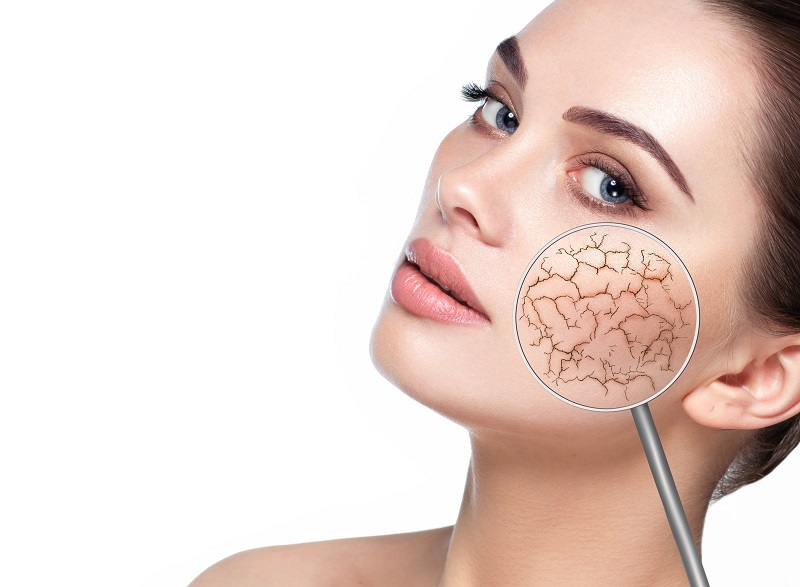Each skin type has unique characteristics and requires a different skincare routine.
Dry skin feels unpleasantly tight and may peel or crack in harsh weather. It needs extra attention to attain the necessary hydration. You may experience dry skin only temporarily (during winter, for example) or it may be a chronic condition.
Keep reading to learn how to get rid of dry skin and ensure it’s always well-hydrated and smooth.

What Are the Common Causes of Dry Skin?
A person’s skin type can change throughout their lifetime, depending on several factors. Those who typically have normal or oily skin may also experience dry skin in certain conditions.
The following factors commonly cause dry skin.
1. Genetics
Scientists have discovered a genetic mutation that may be responsible for inherited dry skin. About 10% of people have dry skin due to genetics. They are prone to developing eczema.
2. Hormones
Hormonal changes may dry out skin, especially in women during menopause. The decrease in estrogen slows the production of collagen and natural skin oils, leaving the skin dry.
Note: Find out more about collagen for skin - benefits and sources.
3. Aging
As we age, the production of skin’s building blocks (collagen, elastin) slows. The skin loses its radiance, suppleness, and moisture. About 50% of people over 40 have drier skin.
4. Environmental Factors
Dry air and extreme temperatures tend to dry out the skin. Normal and oily skin may become dry during summer and winter when we lose moisture due to sweating or low humidity. You may experience dry skin if you spend time in spaces with devices that remove moisture from the air, such as air-conditioners, heaters, wood-burning stoves, and fireplaces.
Note: Learn about dry skin in summer - what causes it and how to treat it.
5. Medications
Certain medications that disrupt the balance of fluids in the blood cause dry skin. Examples include:
- Acne medications like benzoyl peroxide and retinoids
- Medications for high blood pressure
- Diuretics
- Laxatives
- Antihistamines
- Antacids
- Statins
- Certain antibiotics
6. Health Conditions
Certain health conditions may cause dry skin. They include:
- Diabetes
- Psoriasis
- Eczema
- Kidney disease
- Anorexia
- HIV
- Hypothyroidism
- Sjogren’s syndrome
7. Low Water Intake
Our body needs water to deliver oxygen and nutrients to cells effectively. Insufficient water intake negatively impacts the body and depletes the skin’s moisture. Dehydrated skin is typically rough, flaky, and dry.
8. Wrong Hygiene and Skincare Habits
Some hygiene and skincare habits lead to dry skin.
- Long, hot baths leave the skin itchy, red, and irritated. Replace them with quick, five-minute baths or showers with lukewarm water.
- Over-cleansing the skin strips it of natural oils. Use gentle cleansers once or twice per day.
- Soaps, detergents, and perfumed skincare products also dehydrate the skin.
How Do I Stop My Skin Being Dry?
The main thing dry skin needs is proper hydration. Introduce highly moisturizing products into your skincare routine. Always apply moisturizers to damp skin to ensure the skin seals in moisture.
Use oil-based cleansers and creams that contain ceramides, lipids, and humectants such as hyaluronic acid or glycerin.
When Should You Visit a Doctor?
Dry skin isn’t a medical issue. People are usually able to manage their dry skin with sufficient water intake and the right cosmetic products.
However, in some cases, dry skin may be a sign of a severe medical condition. In other cases, it may develop into a severe skin issue if not treated properly.
The following symptoms require medical attention:
- Cracked skin
- Crusts or open sores
- Intense itchiness
- Scaly patches of skin
- Large areas of peeling skin
- Hyperpigmentation
These symptoms may lead to bleeding, infections, pain, and inability to sleep and work. Book an appointment with a dermatologist who will discover the root cause of your overly dry skin and create an adequate treatment plan.
Conclusion
In most cases, dry skin is not harmful. It may feel uncomfortable and lead to complications if you don’t care for it properly. If you hydrate and follow a proper dry skin care routine, your skin will likely maintain healthy moisture levels.


